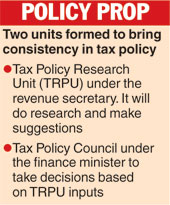
New Delhi, Jan. 3: The government is considering tax breaks on investments in start-ups and Esops (employee stock option plans) offered by such entities.
The Centre is working on a policy on start-ups and a meeting on the issue is scheduled in the middle of this month. As a prelude, the finance ministry has held a series of review meetings and come up with a proposal to offer tax breaks to encourage new technology investments.
One of the measures being considered is to treat investments in start-ups on a par with that in the stock market, officials said.
At present, investments in start-ups attract 33 per cent short-term capital gains tax, while it is 20 per cent for long-term investments. In comparison, investments in stocks has a 15 per cent short-term taxation rate and there is no tax on long-term investments.
Amit Bannerjee, an independent merchant banker, said, "This high rate of taxation has been deterring many angel investors and venture capitalists from investing in start-ups."
Nasscom has been lobbying for tax breaks on investments in tech start-ups but officials said any tax regime should apply to all start-ups.
India has emerged as one of the largest incubators after the US, Great Britain and China with around 72 per cent of the entrepreneurs being under 35 years.
The government wants to catalyse funding in expectation of a bigger wave of start-ups in the coming years. Among the big names who have become angel investors are Ratan Tata, mentor of the Tata group, N.R. Narayana Murthy of Infosys fame and Kunal Bahl, co-founder of start-up Snapdeal, which itself has raised nearly $1.5 billion in several rounds of funding.
Tax breaks on Esops is the other big issue that the start-ups have managed to convince the North Block to consider in this year's budget. Most domestic start-ups operates in technology and e-commerce, which are dependant on human talent more than machinery.
Incentivising human capital to cross over with Esops has been a global phenomenon. However, in India, it has been a dampener as Esops are treated as perks and taxed at the same rate as income. Globally Esops are not taxed.
The North Block is mulling whether Esops can be made tax-free or taxed at a lower rate.
"The problem with this is we cannot exempt Esops by start-ups alone as established industries will argue that they too need to retain talent by offering Esops. A balance needs to be struck," officials said.
The tax breaks will be announced as part of the budget for 2016. However, they will also form part of the policy to be decided at the Prime Minister's meeting. The policy is being developed after consultations with chambers, including software industry body Nasscom, a chamber of Dalit entrepreneurs and top honchos from the Silicon Valley.
Indian start-up heroes include Dhiraj Rajaram, founder of data analytics firm Mu Sigma that is worth $1 billion, Flipkart founders' Sachin Bansal and Binny Bansal, whose 7.5 per cent stake in the e-commerce firm is now worth Rs 9,000 crore, or $1.5 billion, and Rahul Sharma of Micromax, which is believed to be worth Rs 21,000 crore, or $3.5 billion.










